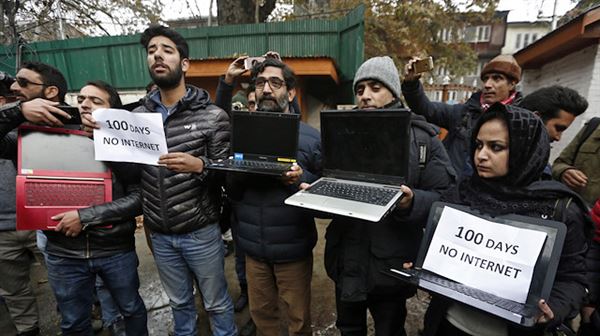A group of Kashmiri journalists have demonstrated at the Kashmir Press Club in Srinagar, to mark 100 days of a telephone and internet ban by Indian au
A group of Kashmiri journalists have demonstrated at the Kashmir Press Club in Srinagar, to mark 100 days of a telephone and internet ban by Indian authorities beginning on Aug. 5.
About 50 journalists, including photographers and videographers, on Tuesday displayed blank laptop screens and placards with messages that read “100 days, no internet” and “stop humiliating Kashmiri journalists.”
Journalists planned a protest march toward the nearby Press Enclave, which houses newspaper offices, but were informed by the police if they marched, they might be arrested under Section 144, which prohibits assembly of more than four people at a public place.
A person detained under this prohibitory order could be fined up to 10,000 Indian rupees ($139) and released only after signing a bond declaring he or she would not again participate in any protest, failing which he might be fined 40,000 rupees ($558) and jailed.
A police vehicle was parked outside the gate of the press club and several policemen in civvies entered the premises to inform club officials about possible punitive measures against the protesters in case the demonstration spilled outside.
“Internet is the vital tool for journalists. We pay for it. We are not demanding any freebie. We are demanding the restoration of services we pay for,” said Parvaiz Bukhari, a senior journalist.
He said availing internet services at the government Media Facilitation Centre was a humiliating experience.
“Journalists have to punch in their details that are noted down by policemen. Then they have to wait in queue for their turn. They are allowed a short time at one of the 10 computer systems. Journalists need to read and connect with their sources, which is not possible at such a restricted place,” he told Anadolu Agency.
Shafat Kira, editor of English daily the Kashmir Vision and spokesman of the Kashmir Editors Guild said bringing out a newspaper without internet felt like a “fish without water.”
“Is it even thinkable that a place like Kashmir can be reported properly without internet?” he said.
Another editor, who requested anonymity, told Anadolu Agency that denying internet to media houses was aimed at regulating journalism.
“When you have to use a government facility for a basic tool of journalism you can imagine the kind of journalism that would be produced. Prominent newspapers have not published editorials for the past three months,” he went on to say.
All journalists presently have access to internet only at the Media Facilitation Centre housed in one of the rooms of the government Information Department, a short distance from the Press Club.
Jammu and Kashmir has been under a near-complete lockdown since the Indian government’s move on Aug. 5 to scrap the special status of the region.
Since then, the government has blocked communication access and imposed restrictions on movement to maintain law and order in the region.
Several rights groups including the Human Rights Watch and Amnesty International have repeatedly called on India to lift restrictions and release political detainees.
Though the Indian government lifted restrictions on movement and restored landlines and post-paid phone services, prepaid phones and internet are still closed across the Kashmir valley.
